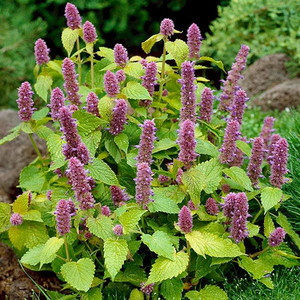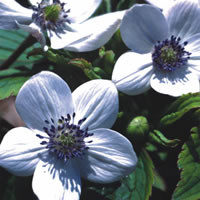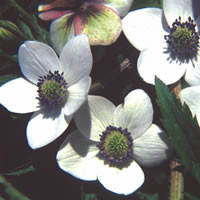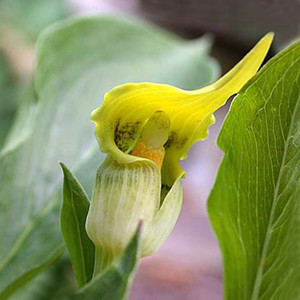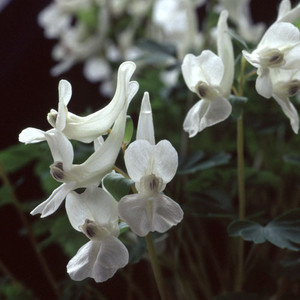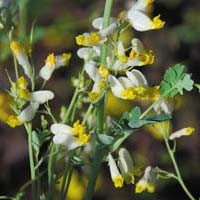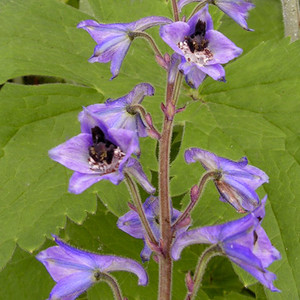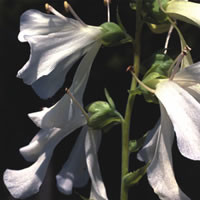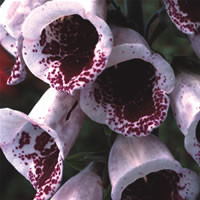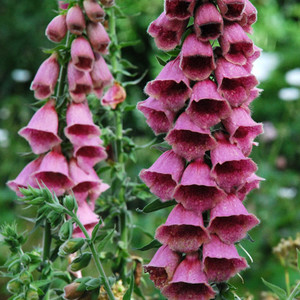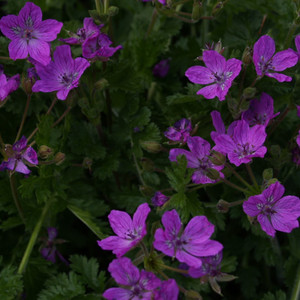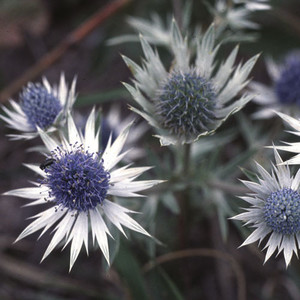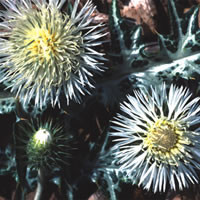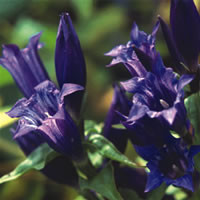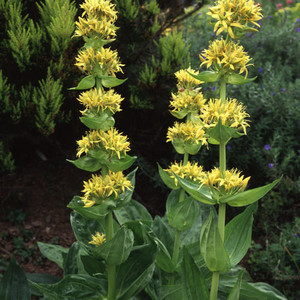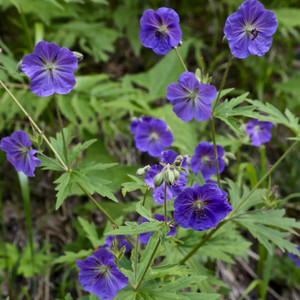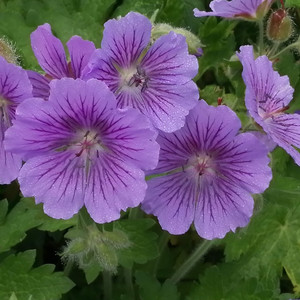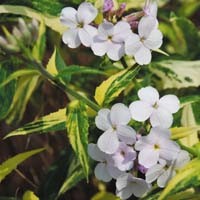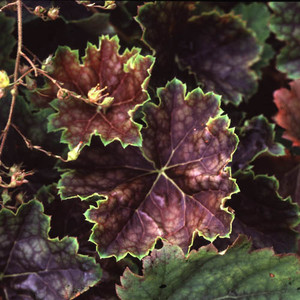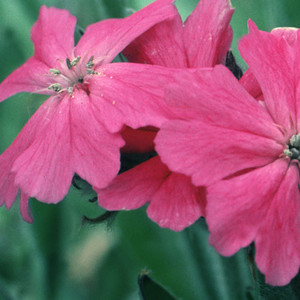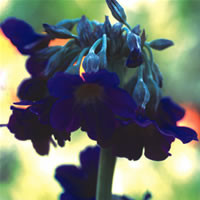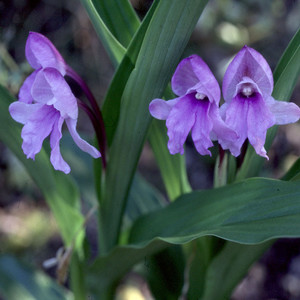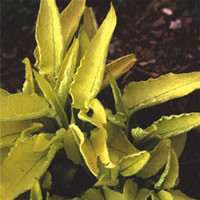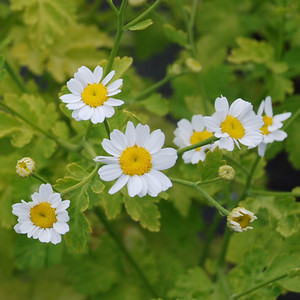-
Nothing here. Please add something or load your cart
-
AGASTACHE 'GREEN CANDLES'
Closed ranks of long green pokers bearing pale, greenish-yellow flowers will make a striking feature in any border. This unusual, fragrant-leaved "bubble mint" will produce a truly dramatic effect when grown as a solitary clump. ... Learn MoreSowing Advice: For best results, sow seeds in good light at any time onto a good soil-based compost. Cover the seeds with fine grit or compost to approximately their own depth. We recommend germinating at 15 to 20 degrees C. Seeds should ideally germinate in between 2 and 6 weeks although they make take considerably longer. Pot on seedlings before finally planting out into a container or a well-drained spot.1 packet @ £2.25 each
-
AGASTACHE FOENICULUM 'GOLDEN JUBILEE'
Discovered here in 1995 and finally given the 'All America Award'. This remarkable gem bears early spring crowns of purplish, crinkled leaves which transform into sweetly aromatic golden rosettes, with tubby terminal spikes of fluffy lavender flowers. Bone hardy with frost and long-lived in a well-drained spot. ... Learn MoreSowing Advice: For best results, sow seeds in good light at any time onto a good soil-based compost. Cover the seeds with fine grit or compost to approximately their own depth. We recommend germinating at 15 to 20 degrees C. Seeds should ideally germinate in between 2 and 6 weeks although they make take considerably longer. Pot on seedlings before finally planting out into a container or a well-drained spot.1 packet @ £2.45 each
-
ANEMONE LEVEILLEI
This is one of the easiest and long-lived of the clump-forming Anemones which improves with age, bearing dense sprays of white waxy-petalled flowers with a blue reverse. An exceptionally beautiful flower from China. ... Learn MoreSowing Advice: Sow seeds IMMEDIATELY you receive them, at any time of the year, they depend on having several months in cold, damp compost, (NOT DRY IN A FRIDGE) before they will germinate. Keep the seed tray moist in a cold greenhouse or shady corner. These fresh seeds can be very slow to germinate. Do not use any artificial heat in an attempt to germinate them as it may cause them to enter even deeper dormancy.1 packet @ £2.25 each
-
ANEMONE RIVULARIS
Anemone rivularis, commonly known as 'riverside windflower', is a clump forming perennial. The white saucer shaped flowers, tinged with blue on the reverse and indigo in the middle are borne on erect, branched stems in late spring and early summer. ... Learn MoreSowing Advice: Sow seeds IMMEDIATELY you receive them, at any time of the year, they depend on having several months in cold, damp compost, (NOT DRY IN A FRIDGE) before they will germinate. Keep the seed tray moist in a cold greenhouse or shady corner. These fresh seeds can be very slow to germinate. Do not use any artificial heat in an attempt to germinate them as it may cause them to enter even deeper dormancy.1 packet @ £2.35 each
-
ANGELICA GIGAS
This magnificent angelica bearing thick shiny leaves has rapidly become a cult plant. In midsummer, globular, almost solid heads, of dark crimson florets erupt on strong stems from inflated purple sheaths, providing a feast for pollinating insects. Very few fertile seeds are ever produced. ... Learn MoreSowing Advice: Sow seeds IMMEDIATELY you receive them, at any time of the year, they depend on having several months in cold, damp compost, (NOT DRY IN A FRIDGE) before they will germinate. Keep the seed tray moist in a cold greenhouse or shady corner. These fresh seeds can be very slow to germinate. Do not use any artificial heat in an attempt to germinate them as it may cause them to enter even deeper dormancy.1 packet @ £2.45 each
-
ANTHERICUM LILIAGO
Numerous thin spires of white star-shaped flowers are produced above clumps of long, narrow grey-green leaves. This lovely dwarf lily has no vices, and will make a steadily expanding clump over the years. ... Learn MoreSowing Advice: Sow seeds at any time, covering them very thinly with compost or grit, keeping the seed pot in a cool, well-lit spot outdoors. Artificial heat is not needed and can prevent germination so be very patient as many species will only germinate in the spring after chilling or freezing in the moist seed pot in the winter. Grow on individual seedlings in small pots until of sufficient size to be potted on or planted out into the open ground.1 packet @ £1.60 each
-
AQUILEGIA 'BLUE DIAMOND'
This little gem is almost certainly the tiniest "growable" aquilegia in the world. Proportionately large blue and white spurred flowers, at least one inch wide, grow on thin delicate stems, over a tiny rosette of delicate blue-green maidenhair leaves. This tiny treasure is a vigorous, easy-to-grow and stable hybrid of the two legendary and more-difficult-to grow plants, Aquilegia jonesii and Aquilegia saximontana. ... Learn MoreSowing Advice: Sow immediately at any time onto preferably a soil-based compost, covering with fine grit to approximately their own depth. Germination MAY be quicker if kept at 15 to 20 degrees C. but many seeds WILL NOT come up the year they are sown, needing winter chilling after sowing, and ONLY come up with natural spring germination.1 packet @ £2.75 each
-
AQUILEGIA LONGISSIMA
This rare beauty from the U.S.A. has finely divided foliage above which open, on long stems, flowers which have the longest spurs of probably any aquilegia. These are in brightest yellow, with paler lemon petals, and open over a long period in early summer. ... Learn MoreSowing Advice: Sow immediately at any time onto preferably a soil-based compost, covering with fine grit to approximately their own depth. Germination MAY be quicker if kept at 15 to 20 degrees C. but many seeds WILL NOT come up the year they are sown, needing winter chilling after sowing, and ONLY come up with natural spring germination.1 packet @ £2.60 each
-
AQUILEGIA OTTONIS AMALIAE
This gorgeous, rarely encountered, and quite compact plant with distinctive blue and white flowers is found in the South East Mediterranean, and particularly in Italy where it is known as Aquilegia di Re Otto. ... Learn MoreSowing Advice: Seeds can be sown at any time but are best sown in winter or early spring to benefit from a cold spell in the wet compost to break their dormancy. We advise covering seeds very thinly with sand or fine grit to about the depth of the seed size. If the seeds do not come up within 6 to 12 weeks the damp seed tray can be given cold treatment in a fridge for about four weeks. They may still take very many months to appear, so please never discard the pot or tray.1 packet @ £1.95 each
-
AQUILEGIA VIRIDIFLORA
This elegant,rare and choice Siberian plant produces delicate sprays of very sweetly perfumed green-skirted flowers with intriguing chocolate-brown centres from late spring onwards. These neatly compact plants are collector's items and are perfect for borders and rockeries. Very few seeds are ever collected. ... Learn MoreSowing Advice: Sow immediately at any time onto preferably a soil-based compost, covering with fine grit to approximately their own depth. Germination MAY be quicker if kept at 15 to 20 degrees C. but many seeds WILL NOT come up the year they are sown, needing winter chilling after sowing, and ONLY come up with natural spring germination.1 packet @ £2.95 each
-
AQUILEGIA VULGARIS 'GREEN APPLES'
Perhaps the first green clematis-flowered aquilegia. A superlative form which we have selected here at Plant World which has compressed buds opening pale lime green slowly fading to a creamy-green sliced-apple colour. ... Learn MoreSowing Advice: Sow immediately at any time onto preferably a soil-based compost, covering with fine grit to approximately their own depth. Germination MAY be quicker if kept at 15 to 20 degrees C. but many seeds WILL NOT come up the year they are sown, needing winter chilling after sowing, and ONLY come up with natural spring germination.1 packet @ £2.75 each
-
AQUILEGIA YABEANA
A most amazing and vigorous plant from the mountains of Japan, carrying deepest inky blue, long spurred flowers on long stems. When planted 'en masse' it creates an unforgettable sight. Named after Yoshisada Yabe, a Japanese botanist, it is long blooming, vigorous and hardy but prefers a sunny to half shady site that is is moist. This amazing species withstands temperatures down to minus 40°C (-40°F) and will reliably return each spring, no matter how cold the winters is. ... Learn MoreSowing Advice: Sow immediately at any time onto preferably a soil-based compost, covering with fine grit to approximately their own depth. Germination MAY be quicker if kept at 15 to 20 degrees C. but many seeds WILL NOT come up the year they are sown, needing winter chilling after sowing, and ONLY come up with natural spring germination.1 packet @ £2.65 each
-
ARISAEMA FLAVUM
This exciting Himalayan arum relative has most impressive, deeply-cut, hand-like leaves, from which arise the fascinating 'flowers'. A floppy yellow hood-like spathe protects the purple waxy spadix. Very long-lived and bulks up by division of the corms. ... Learn MoreSowing Advice: For best results, sow seeds as soon as you receive them onto a good soil-based compost. Cover the seeds with fine grit or compost to approximately their own depth. These seeds can be very slow indeed to germinate, and may wait for spring before emerging whenever sown. Do not use artificial heat to try to germinate them as it will simply disrupt their germination mechanism. Please be very patient, and do not discard the seed pan.1 packet @ £2.75 each
-
ASTRAGALUS PELECINUS
A most unusual plant in the clover family bearing pink and purple flowers above clumps of pinnate leaves. Intriguingly shaped seed pods with deeply-scalloped edges later appear. ... Learn MoreSowing Advice: Seeds can be sown at any time but are best sown in winter or early spring to benefit from a cold spell in the wet compost to break their dormancy. We advise covering seeds very thinly with sand or fine grit to about the depth of the seed size. If the seeds do not come up within 6 to 12 weeks the damp seed tray can be given cold treatment in a fridge for about four weeks. They may still take very many months to appear, so please never discard the pot or tray.1 packet @ £2.20 each
-
CAMPANULA ODONTOSEPALA
This rare, unique, and elusive plant has been obtained from the Hungarian Botanic Garden at Vacratot, where it makes a slowly-spreading carpet of delicate stems carrying thin-tubed, flared-ended, sky blue flowers which have great value as they appear very late in the year, right into the first frosts, when almost all other bellflowers are long-gone. In fact, the last-flowering bellflower you can get! In the wild it grows in damp meadows in the foothills of Russia, northern Asia and Iran. It is also possibly the only "symphyandra" (rather than campanula) which has a gently-running perennial habit! ... Learn MoreSowing Advice: Sow immediately at any time onto preferably a soil-based compost, covering with fine grit to approximately their own depth. Germination MAY be quicker if kept at 15 to 20 degrees C. but many seeds WILL NOT come up the year they are sown, needing winter chilling after sowing, and ONLY come up with natural spring germination.1 packet @ £2.60 each
-
CAMPANULA PUNCTATA 'BEETROOT'
This real show-stopper of a plant opens very large tubular bells which are heavily washed with purple outside and liberally spotted inside with red and purple. A gorgeous specimen making a slowly-spreading carpet. "Rare and unusual." (Graham Stuart Thomas). Seeds are collected from this selected bed of plants, but you will always discover a proportion of subsequent seedlings with different flower colours and markings, so please select the best. ... Learn MoreSowing Advice: Sow immediately at any time onto preferably a soil-based compost, covering with fine grit to approximately their own depth. Germination MAY be quicker if kept at 15 to 20 degrees C. but many seeds WILL NOT come up the year they are sown, needing winter chilling after sowing, and ONLY come up with natural spring germination.1 packet @ £2.95 each
-
CAMPANULA PUNCTATA NANA
This is the very dwarfest form of this hardy perennial with large, pale pink tubular bells produced in early summer, with the occasional white form popping up. It is excellent, whether in a large container or the border, performing well in sun or partial shade. ... Learn MoreSowing Advice: Sow immediately at any time onto preferably a soil-based compost, covering with fine grit to approximately their own depth. Germination MAY be quicker if kept at 15 to 20 degrees C. but many seeds WILL NOT come up the year they are sown, needing winter chilling after sowing, and ONLY come up with natural spring germination.1 packet @ £2.35 each
-
CARYOPTERIS INCANA
This gorgeous deciduous shrub bears terminal clusters of tubular, violet-blue flowers from late summer to early autumn when most others have finished. When crushed, the fragrant green leaves produce a fragrance of an oriental incense! We provide seed from the more compact weeping form, which is absolutely superb if trained as a standard. ... Learn MoreSowing Advice: Seeds have already been thoroughly cleaned and cold-stored for several months. Sow into well-drained, sandy compost at any time of year, cover to their own depth with sand or grit. No artificial heat is needed; seed tray is best left in a cool protected spot and kept moist. Seeds usually germinate in spring, regardless of when sown.1 packet @ £1.90 each
-
CORYDALIS MALKENSIS
This diminutive treasure is packed with racemes of large, white or creamy-yellow tubular flowers above finely-divided glaoucous foliage, very early in the year. It will thrive virtually everywhere, making a superb show every spring, along with a gentle increase underground. It may also self sow a little but never to cause a problem, and soon after flowering this amazing plant vanishes underground into hardy tubers for another 9 months ... Learn MoreSowing Advice: Seeds can be sown at any time but are best sown in winter or early spring to benefit from a cold spell in the wet compost to break their dormancy. We advise covering seeds very thinly with sand or fine grit to about the depth of the seed size. If the seeds do not come up within 6 to 12 weeks the damp seed tray can be given cold treatment in a fridge for about four weeks. They may still take very many months to appear, so please never discard the pot or tray.1 packet @ £2.80 each
-
CORYDALIS SEMPERVIRENS ALBA
The lovely albino form of this plant. Sown early can make an impressive mass smothered with yellow-tipped snow-white flowers. ... Learn MoreSowing Advice: Seeds can be sown at any time but are best sown in winter or early spring to benefit from a cold spell in the wet compost to break their dormancy. We advise covering seeds very thinly with sand or fine grit to about the depth of the seed size. If the seeds do not come up within 6 to 12 weeks the damp seed tray can be given cold treatment in a fridge for about four weeks. They may still take very many months to appear, so please never discard the pot or tray.1 packet @ £1.80 each
-
CORYDALIS TALIENSIS
Why this long-lived beauty has evaded discovery until now is a mystery. Massed drooping stems of sizeable pale purple flowers are held above delicate ferny foliage. Superlative in a shady spot. ... Learn MoreSowing Advice: Seeds can be sown at any time but are best sown in winter or early spring to benefit from a cold spell in the wet compost to break their dormancy. We advise covering seeds very thinly with sand or fine grit to about the depth of the seed size. If the seeds do not come up within 6 to 12 weeks the damp seed tray can be given cold treatment in a fridge for about four weeks. They may still take very many months to appear, so please never discard the pot or tray.1 packet @ £2.35 each
-
CREMANTHODIUM ARNICOIDES
This rare and beautiful daisy, which bears nodding, dark-eyed yellow daisies with twisted petals, grows high in the Himalayas where it thrives in damp shady meadows. A challenge to grow but worth the effort! ... Learn MoreSowing Advice: Seeds can be sown at any time but are best sown in winter or early spring to benefit from a cold spell in the wet compost to break their dormancy. We advise covering seeds very thinly with sand or fine grit to about the depth of the seed size. If the seeds do not come up within 6 to 12 weeks the damp seed tray can be given cold treatment in a fridge for about four weeks. They may still take very many months to appear, so please never discard the pot or tray.1 packet @ £3.85 each
-
DELPHINIUM MAACKIANUM
A very rare and lovely new variety from Siberia and Manchuria, barely yet in cultivation. Thick, greyish, rather felted leaves are held on strong stems which bear numerous deep blue flowers surrounded by purple bracts. ... Learn MoreSowing Advice: Sow immediately at any time onto preferably a soil-based compost, covering with fine grit to approximately their own depth. Germination MAY be quicker if kept at 15 to 20 degrees C. but many seeds WILL NOT come up the year they are sown, needing winter chilling after sowing, and ONLY come up with natural spring germination.1 packet @ £2.65 each
-
DIGITALIS 'ANNE REDETZKY'
An intriguing and novel dwarf foxglove. The whole of the creamy trumpet flower is cut in several places along its length, which then reflexes back, producing an almost orchid-like appearance. Possibly the most attractive digitalis of all. ... Learn MoreSowing Advice: Sow immediately at any time onto preferably a soil-based compost, covering with fine grit to approximately their own depth. Germination MAY be quicker if kept at 15 to 20 degrees C. but many seeds WILL NOT come up the year they are sown, needing winter chilling after sowing, and ONLY come up with natural spring germination.1 packet @ £2.95 each
-
DIGITALIS PURPUREA 'PAM'S CHOICE'
One of the best new foxgloves to be found in recent years. Stout, strong spires of creamy white flowers with their throats almost solidly painted in deepest burgundy. En masse it makes an unforgettable sight. ... Learn MoreSowing Advice: Sow immediately at any time onto preferably a soil-based compost, covering with fine grit to approximately their own depth. Germination MAY be quicker if kept at 15 to 20 degrees C. but many seeds WILL NOT come up the year they are sown, needing winter chilling after sowing, and ONLY come up with natural spring germination.1 packet @ £2.40 each
-
DIGITALIS X MERTONENSIS
The sumptuous 'Strawberry Foxglove' has individually the largest flowers of all foxgloves, resembling very large flattened trumpets the colour of strawberry puree on shortish stout spikes, which open in early summer. This valuable plant with soft hairy leaves and a long-lived habit is one of the most magnificent hybrid foxgloves. ... Learn MoreSowing Advice: Sow immediately at any time onto preferably a soil-based compost, covering with fine grit to approximately their own depth. Germination MAY be quicker if kept at 15 to 20 degrees C. but many seeds WILL NOT come up the year they are sown, needing winter chilling after sowing, and ONLY come up with natural spring germination.1 packet @ £2.45 each
-
EPILOBIUM ANGUSTIFOLIUM ALBUM
The rarely offered and very lovely snow white form of "Rosebay Willowherb" is an extremely long-flowering plant which is not quite as invasive as its pink relative. Coming true from seed, it makes a dazzling foil to other brighter flowers in any area where it can be controlled and prevented from straying too far. In poor soil or a wild garden it makes an impressive sight! ... Learn MoreSowing Advice: Sow immediately at any time onto preferably a soil-based compost, covering with fine grit to approximately their own depth. Germination MAY be quicker if kept at 15 to 20 degrees C. but many seeds WILL NOT come up the year they are sown, needing winter chilling after sowing, and ONLY come up with natural spring germination.1 packet @ £2.55 each
-
ERODIUM MANESCAVII
Deepest lilac-pink flowers are repeatedly produced for many months over a cascading clump of lovely feathery leaves. This beautiful, long-flowering, very long-lived plant will put on a superb show for year after year where others will not survive. It thrives in all soils and aspects too! ... Learn MoreSowing Advice: Sow immediately at any time onto preferably a soil-based compost, covering with fine grit to approximately their own depth. Germination MAY be quicker if kept at 15 to 20 degrees C. but many seeds WILL NOT come up the year they are sown, needing winter chilling after sowing, and ONLY come up with natural spring germination.1 packet @ £2.35 each
-
ERYNGIUM 'BLUE STEEL'
An extremely spiky, very dark metallic blue multi-headed plant collected by Graham Pattison's 1994 Mexico Expedition at 10,000ft, near Potrero Nuevo. (PC&H 268) Obviously completely hardy and very choice. ... Learn MoreSowing Advice: Sow seeds IMMEDIATELY you receive them, at any time of the year, they depend on having several months in cold, damp compost, (NOT DRY IN A FRIDGE) before they will germinate. Keep the seed tray moist in a cold greenhouse or shady corner. These fresh seeds can be very slow to germinate. Do not use any artificial heat in an attempt to germinate them as it may cause them to enter even deeper dormancy.1 packet @ £1.95 each
-
ERYNGIUM GIGANTEUM 'MISS WILMOTT'S GHOST'
One of the most impressive summer plants you can grow in the UK, with unbelievable metallic silvery-blue leaves, flowers and stems. The word gigantea refers to the flowers, not the plants which are rarely more than 0.6 metres high. So named, as famous gardener, Miss Wilmott, used to walk around friends' gardens secretly scattering the seeds from her pocket. Surprisingly, and totally unexpectedly (so please remember this...), they come up the first year with soft green leaves, nothing at all like the final plant. They later die down to a hardy tuber to overwinter. But, surprise, surprise....the following year erupts the fabulous metallic, silver-grey familiar foliage, followed by the amazing flower heads. Everyone should grow one! ... Learn MoreSowing Advice: Sow seeds IMMEDIATELY you receive them, at any time of the year, they depend on having several months in cold, damp compost, (NOT DRY IN A FRIDGE) before they will germinate. Keep the seed tray moist in a cold greenhouse or shady corner. These fresh seeds can be very slow to germinate. Do not use any artificial heat in an attempt to germinate them as it may cause them to enter even deeper dormancy.1 packet @ £2.45 each
-
ERYNGIUM MARITIMUM
One of the most beautiful of all foliage plants, this rare sea-holly, as its name suggests, is to be found growing on sandy seashores. Thick, sharply-pointed, metallic-grey leaves on strong stems terminate in spiny, metallic blue-grey flowers. Fabulous and completely perennial in a well-drained border or rockery. ... Learn MoreSowing Advice: Sow seeds IMMEDIATELY you receive them, at any time of the year, they depend on having several months in cold, damp compost, (NOT DRY IN A FRIDGE) before they will germinate. Keep the seed tray moist in a cold greenhouse or shady corner. These fresh seeds can be very slow to germinate. Do not use any artificial heat in an attempt to germinate them as it may cause them to enter even deeper dormancy.1 packet @ £2.70 each
-
GALACTITES TOMENTOSA ALBA
One of the most attractive winter rosettes of any plant. Strikingly variegated 'soft' thistle leaves sprout forth a multitude of purple summer flowers on the standard plant which gently self-seeds in a hot year. This is the incredible albino version of the lovely purple form. Discovered by Dorian Roxburgh on her parent's farm in South West Spain and brought back to England. Sprays of fragrant green-eyed white flowers in long succession all summer. Fertile seeds are few and must be collected individually by hand. ... Learn MoreSowing Advice: For best results, seeds are best sown directly into the ground where required in the spring. These seeds are very sticky and must be pulled apart before being sown. Alternatively, sow in early spring in gentle warmth at 15-20 degrees C. Prick out into small 3" pots and plant in final position when the plants are established.1 packet @ £2.45 each
-
GENTIANA ASCLEPIADEA
The "Willow Gentian" is one of the few plants that really does improve with time. Hundreds of upturned deep blue trumpets on arching stems through summer and into late autumn. The easiest, longest lived, latest flowering and most rewarding of the taller gentians. ... Learn MoreSowing Advice: Seeds can be sown at any time but are best sown in winter or early spring to benefit from a cold spell in the wet compost to break their dormancy. We advise covering seeds very thinly with sand or fine grit to about the depth of the seed size. If the seeds do not come up within 6 to 12 weeks the damp seed tray can be given cold treatment in a fridge for about four weeks. They may still take very many months to appear, so please never discard the pot or tray.1 packet @ £2.45 each
-
GENTIANA ASCLEPIADEA 'PHYLLIS'
This lovely and quite outstanding plant is the rare, pale eggshell blue form of the "Willow Gentian". Being much more subdued in colour, it can add a delicate pastel shade to the autumn border. ... Learn MoreSowing Advice: Seeds can be sown at any time but are best sown in winter or early spring to benefit from a cold spell in the wet compost to break their dormancy. We advise covering seeds very thinly with sand or fine grit to about the depth of the seed size. If the seeds do not come up within 6 to 12 weeks the damp seed tray can be given cold treatment in a fridge for about four weeks. They may still take very many months to appear, so please never discard the pot or tray.1 packet @ £1.95 each
-
GENTIANA ASCLEPIADEA 'WHITETHROAT'
Stunning late summer blooms from August until October when most other colour has gone. The choice bicoloured form. Aptly named with pure white-throated blue trumpets spaced up graceful arching srems. ... Learn MoreSowing Advice: Seeds can be sown at any time but are best sown in winter or early spring to benefit from a cold spell in the wet compost to break their dormancy. We advise covering seeds very thinly with sand or fine grit to about the depth of the seed size. If the seeds do not come up within 6 to 12 weeks the damp seed tray can be given cold treatment in a fridge for about four weeks. They may still take very many months to appear, so please never discard the pot or tray.1 packet @ £2.45 each
-
GENTIANA LUTEA
Strong, noble spires of large, golden, star-like flowers open in late spring over clumps of large basal lily-like leaves. A superb gentian and one of the most magnificent, easy-to-grow, and long lived plants you can ever wish to grow. ... Learn MoreSowing Advice: Seeds can be sown at any time but are best sown in winter or early spring to benefit from a cold spell in the wet compost to break their dormancy. We advise covering seeds very thinly with sand or fine grit to about the depth of the seed size. If the seeds do not come up within 6 to 12 weeks the damp seed tray can be given cold treatment in a fridge for about four weeks. They may still take very many months to appear, so please never discard the pot or tray.1 packet @ £2.25 each
-
GERANIUM ENDRESSII 'PINK LACE'
The seedlings from this strikingly lined and pencilled new hybrid come quite true in a corner of our cottage garden, producing a long succession of bright flowers throughout spring and early summer. This tough plant does well in dry conditions and grows well in shade too! ... Learn MoreSowing Advice: Sow immediately at any time onto preferably a soil-based compost, covering with fine grit to approximately their own depth. Germination MAY be quicker if kept at 15 to 20 degrees C. but many seeds WILL NOT come up the year they are sown, needing winter chilling after sowing, and ONLY come up with natural spring germination.1 packet @ £2.35 each
-
GERANIUM ERIANTHUM
Thick, slightly woolly, alchemilla-like leaves on low stems adorn this compact plant which has darker-veined, deep blue flowers, a rare true colour in this family. Very rarely seen or offered, this is a choice, long-lived, very hardy and valuable plant. ... Learn MoreSowing Advice: Sow immediately at any time onto preferably a soil-based compost, covering with fine grit to approximately their own depth. Germination MAY be quicker if kept at 15 to 20 degrees C. but many seeds WILL NOT come up the year they are sown, needing winter chilling after sowing, and ONLY come up with natural spring germination.1 packet @ £2.60 each
-
GERANIUM IBERICUM
Large, deepest violet flowers with notched petals, adorn this handsome, bone hardy, long-lived plant, which bears hairy, deeply-divided leaves in midsummer. This is one of the parents of the old and sterile, but still favourite, Geranium magnificum which has always been a solid performer with no vices. ... Learn MoreSowing Advice: Sow immediately at any time onto preferably a soil-based compost, covering with fine grit to approximately their own depth. Germination MAY be quicker if kept at 15 to 20 degrees C. but many seeds WILL NOT come up the year they are sown, needing winter chilling after sowing, and ONLY come up with natural spring germination.1 packet @ £2.55 each
-
GERANIUM PLATYANTHUM
(Also called G. eriostemon). A rare and most unusual plant from Korea and Japan. Large shallowly lobed, glaucous toothed leaves grow from a thick rootstock. Dense clusters of flat-faced white-eyed mauve-blue flowers appear from early spring through into summer. Spectacular if given space. ... Learn MoreSowing Advice: Sow immediately at any time onto preferably a soil-based compost, covering with fine grit to approximately their own depth. Germination MAY be quicker if kept at 15 to 20 degrees C. but many seeds WILL NOT come up the year they are sown, needing winter chilling after sowing, and ONLY come up with natural spring germination.1 packet @ £2.30 each
-
GERANIUM PYRENAICUM 'BILL WALLIS'
This is the best cultivar (coming true) of the type, with especially desirable, very deep violet-purple flowers, which are at their impressive best in the late evening. This cultivar is often wrongly spelled 'Bill Wallace'. ... Learn MoreSowing Advice: Sow immediately at any time onto preferably a soil-based compost, covering with fine grit to approximately their own depth. Germination MAY be quicker if kept at 15 to 20 degrees C. but many seeds WILL NOT come up the year they are sown, needing winter chilling after sowing, and ONLY come up with natural spring germination.1 packet @ £2.35 each
-
GERANIUM WLASSOVIANUM
A gem from north-eastern China. White-eyed purple-violet flowers, veined in deep violet appear all summer long. Attractive, velvety textured, pinkish-bronze spring foliage later turns brilliant red. ... Learn MoreSowing Advice: Sow immediately at any time onto preferably a soil-based compost, covering with fine grit to approximately their own depth. Germination MAY be quicker if kept at 15 to 20 degrees C. but many seeds WILL NOT come up the year they are sown, needing winter chilling after sowing, and ONLY come up with natural spring germination.1 packet @ £2.75 each
-
GERANIUM YOSHINOI
A low species from Japan with a tight, creeping habit resembling aubretia. Slowly spreading prostrate stolons, occasionally rooting, make a diminutive leafed clinging carpet peppered with a steady succession of bright pink flowers until late autumn. ... Learn MoreSowing Advice: Sow immediately at any time onto preferably a soil-based compost, covering with fine grit to approximately their own depth. Germination MAY be quicker if kept at 15 to 20 degrees C. but many seeds WILL NOT come up the year they are sown, needing winter chilling after sowing, and ONLY come up with natural spring germination.1 packet @ £2.30 each
-
HESPERIS MATRONALIS VARIEGATA
"Dame's Violet", "Sweet Rocket", or "Damask Flower" has been a favourite cottage garden flower for hundreds of years. We now offer the first ever variegated seed strain of this perfumed old cottage garden favourite. ... Learn MoreSowing Advice: Sow immediately at any time onto preferably a soil-based compost, covering with fine grit to approximately their own depth. Germination MAY be quicker if kept at 15 to 20 degrees C. but many seeds WILL NOT come up the year they are sown, needing winter chilling after sowing, and ONLY come up with natural spring germination.1 packet @ £2.45 each
-
HEUCHERA 'EMPEROR'S CLOAK' (AMERICANA)
Puckered, folded and pleated leaves, from beetroot red to deep purple and which appear to be transparent in the sun, produce a mound from which arise thin stems carrying fluffy white, superbly contrasting flowers. ... Learn MoreSowing Advice: Sow immediately at any time onto preferably a soil-based compost, covering with fine grit to approximately their own depth. Germination MAY be quicker if kept at 15 to 20 degrees C. but many seeds WILL NOT come up the year they are sown, needing winter chilling after sowing, and ONLY come up with natural spring germination.1 packet @ £2.60 each
-
HEUCHERA AMERICANA 'BLOOD-VEIN'
A selected form of the rare Heuchera americana with thick rounded and lobed leaves, and producing sprays of greenish-pink flowers. Many plants though will have leaves brightly decorated with deep crimson veins ... Learn MoreSowing Advice: Sow immediately at any time onto preferably a soil-based compost, covering with fine grit to approximately their own depth. Germination MAY be quicker if kept at 15 to 20 degrees C. but many seeds WILL NOT come up the year they are sown, needing winter chilling after sowing, and ONLY come up with natural spring germination.1 packet @ £2.45 each
-
HORMINUM PYRENAICUM
From the ramonda-like rosettes of this tiny salvia relative arise many spikes holding dark violet-blue flowers which are most attractive to butterflies. Ideal in wall, trough or rock garden, this alpine gem is seldom seen, although it is an easy plant for the rock garden or for edging in a moist border. It looks particularly good when growing in the cracks between rocks, where the roots can search for cool and moist conditions. ... Learn MoreSowing Advice: Sow immediately at any time onto preferably a soil-based compost, covering with fine grit to approximately their own depth. Germination MAY be quicker if kept at 15 to 20 degrees C. but many seeds WILL NOT come up the year they are sown, needing winter chilling after sowing, and ONLY come up with natural spring germination.1 packet @ £1.90 each
-
LIGULARIA VOROBIEVII
A superb ligularia with darkest purple, almost black stems, carrying impressive spikes of short stemmed orange-yellow flowers in early summer, above basal rosettes of thick, leathery coltsfoot-like leaves. ... Learn MoreSowing Advice: Sow immediately at any time onto preferably a soil-based compost, covering with fine grit to approximately their own depth. Germination MAY be quicker if kept at 15 to 20 degrees C. but many seeds WILL NOT come up the year they are sown, needing winter chilling after sowing, and ONLY come up with natural spring germination.1 packet @ £2.45 each
-
LOMELOSIA 'BLUE MOUND'
This new, fabulous, previously unknown scabious relative, collected high in the Taurus mountains of Turkey, may be the rarest plant we have ever sold. A dome of leathery leaves produces a summer-long succession of almost stemless, blue scabious flowers. The small proportion of solid, fertile seeds are very frugally produced and are collected individually. ... Learn MoreSowing Advice: Sow immediately at any time onto preferably a soil-based compost, covering with fine grit to approximately their own depth. Germination MAY be quicker if kept at 15 to 20 degrees C. but many seeds WILL NOT come up the year they are sown, needing winter chilling after sowing, and ONLY come up with natural spring germination.1 packet @ £2.95 each
-
LYCHNIS FLOS-JOVIS NANA
This scarce and most delightful dwarf form of this lovely garden plant has woolly leaves and stems and generous heads of crimson flowers in early summer. It makes a long-lived and valuable flower for the rockery or front of the border. ... Learn MoreSowing Advice: Sow immediately at any time onto preferably a soil-based compost, covering with fine grit to approximately their own depth. Germination MAY be quicker if kept at 15 to 20 degrees C. but many seeds WILL NOT come up the year they are sown, needing winter chilling after sowing, and ONLY come up with natural spring germination.1 packet @ £1.90 each
-
MECONOPSIS DISCIGERA
A very rare plant in which a dense rosette of sharp hairy, almost spiny leaves develops, which increases in size until the plant finally flowers when it produces a raceme of deep blue flowers up to 40cm. It occurs from east Nepal, through Sikkim to central and north Bhutan and south Tibet. ... Learn MoreSowing Advice: Seed should be sown in peaty compost and covered very thinly in a cool, moist spot. Germination is always very slow and erratic so be very patient and do not apply heat. Seedlings should be grown on in small pots in a cool shady place until the pot fills with roots, before planting out in organic, moist soil.1 packet @ £2.95 each
-
MECONOPSIS GRANDIS 'WAVY-PETALS'
Meconopsis grandis is the best of the large-flowered, perennial wild forms. The usual forms of this plant have quite smooth, slightly curved petals, but this unusual form, which comes true from seed, has attractively twisted and corrugated deep blue petals surrounding the central boss of golden anthers. ... Learn MoreSowing Advice: Seed should be sown in peaty compost and covered very thinly in a cool, moist spot. Germination is always very slow and erratic so be very patient and do not apply heat. Seedlings should be grown on in small pots in a cool shady place until the pot fills with roots, before planting out in organic, moist soil.1 packet @ £2.90 each
-
MECONOPSIS QUINTUPLINERVIA 'FARRER'S FORM'
The rare "Farrer's Harebell Poppy" is one of the most beautiful and valuable of the Asiatic poppies. In early spring, small tufted rosettes of long, golden-haired leaves thrust up delicate stems holding pendulous lavender-blue bells, each with a golden eye. Totally hardy and completely perennial, it has a running rootstock! Yes! it puts out numerous underground runners, so that in loose, gritty,organic soil, new plants pop up several feet away from the parent. Every alpine garden or shady rockery should try to establish this gorgeous gem. Seeds are very scarce and very few are ever produced. ... Learn MoreSowing Advice: Seed should be sown in peaty compost and covered very thinly in a cool, moist spot. Germination is always very slow and erratic so be very patient and do not apply heat. Seedlings should be grown on in small pots in a cool shady place until the pot fills with roots, before planting out in organic, moist soil.1 packet @ £3.75 each
-
MECONOPSIS RUDIS
A rare and unusual blue poppy with bristly, spiny stems and leaves, and frilly cobalt-blue flowers with attractive central bosses of white anthers. Flowers are produced over an extended period until late in the year. This is one of the few Asiatic meconopsis with the ability to "hibernate" if a dry summer prevents it from flowering successfully, when it quickly dies down to a resting tuber which will sprout again the following spring! ... Learn MoreSowing Advice: Seeds can be sown at any time, but for a full season of growth are best sown in trays in early spring. Cover seeds thinly in a cool spot, artificial heat is rarely needed as this can cause rapid germination and fungal attack. Seedlings usually appear within 3 to 6 weeks but can take much longer. Pot on into small pots and protect from hot sun. Plant out into a shaded, moist, peaty or organic soil. Many are herbaceous, dying down to a large, resting, winter bud.1 packet @ £2.90 each
-
MOLOPOSPERMUM PELOPONNESIACUM
This rare and strikingly attractive, strongly aromatic plant, comes from the mountains of central and southern Europe and bears jaggedly cut, glossy green foliage, and creamy umbels turning lime green. In late spring it produces large numbers of yellowish-white, sweetly fragrant flowers, which in turn form large, intriguing heads of sizeable, twisted seeds.... And yes, what a brilliant name! ... Learn MoreSowing Advice: Sow immediately at any time onto preferably a soil-based compost, covering with fine grit to approximately their own depth. Germination MAY be quicker if kept at 15 to 20 degrees C. but many seeds WILL NOT come up the year they are sown, needing winter chilling after sowing, and ONLY come up with natural spring germination. Plant out in a well-drained, sheltered position.1 packet @ £1.95 each
-
MYOSOTIS SYLVATICA ROLLED GOLD
A brand new plant, coming true from seed, recently discovered as a chance seedling discovered here at Plant World. Compact domes of golden leaves are held beneath sprays of blue forget-me-not flowers which appear in mid summer. This lovely new plant will very gently self-seed making a blue-studded golden carpet! ... Learn MoreSowing Advice: Sow at any time and cover thinly with compost or grit in gentle heat or a warm bright spot outside. Grow on individual seedlings in three inch pots. Will do best if planted out in a well-prepared bed in moist soil in a shady position.1 packet @ £1.95 each
-
ONOPORDUM ACANTHIUM
This is truly one of the most impressive plants you can grow in the UK if you can give it room. Candelabras of large mauve flowers open on much-branching white woolly stems which arise from a huge grey spiky rosette in spring. ... Learn MoreSowing Advice: Sow immediately at any time onto preferably a soil-based compost, covering with fine grit to approximately their own depth. Germination MAY be quicker if kept at 15 to 20 degrees C. but many seeds WILL NOT come up the year they are sown, needing winter chilling after sowing, and ONLY come up with natural spring germination.1 packet @ £1.85 each
-
PAPAVER MIYABEANUM
This most desirable Japanese midget has unusual yellow flowers on short stems above tiny evergreen hairy rosettes of ferny foliage. A superlative plant to allow to naturalise on a rockery where it will move in drifts over the years. ... Learn MoreSowing Advice: Sow immediately at any time onto preferably a soil-based compost, covering with fine grit to approximately their own depth. Germination MAY be quicker if kept at 15 to 20 degrees C. but many seeds WILL NOT come up the year they are sown, needing winter chilling after sowing, and ONLY come up with natural spring germination.1 packet @ £2.25 each
-
PRIMULA 'ORANGE SPLASH'
This completely new form of "hose-in-hose" primula has been produced here in the gardens at Plant World. The busy bees here have managed to cross our new hose-in-hose cowslip with an old fashioned polyanthus. The result, as you can see, is a completely new and novel type of primula. And seedlings from these plants will probably produce even more unusual and bizarre oddities! ... Learn MoreSowing Advice: Seeds can be sown at any time but are best sown in winter or early spring to benefit from a cold spell in the wet compost to break their dormancy. We advise covering seeds very thinly with sand or fine grit to about the depth of the seed size. If the seeds do not come up within 6 to 12 weeks the damp seed tray can be given cold treatment in a fridge for about four weeks. They may still take very many months to appear, so please never discard the pot or tray.1 packet @ £2.95 each
-
PRIMULA ALPICOLA
A choice and outstandingly fragrant plant from the high mountains of Tibet. Umbels of pendent bell-like violet flowers, powdered in the throat, are produced on long stems in early spring. ... Learn MoreSowing Advice: Primula seeds may be sown in good light conditions at any time onto a loam-based compost, barely cover so that around 50% are still visible. We never use artificial heat, primulas are COOL germinators! As a rule best temperatures are usually between 10 and 15 degrees C. (e.g. a cool greenhouse or northerly window sill) PLEASE NOTE: Temperatures exceeding 15 C can prevent germination, and above 20 C expect very little germination as seeds can go dormant as a protective measure. Germination can take up to 6 weeks, but sometimes takes much longer.1 packet @ £2.65 each
-
PRIMULA HEUCHERIFOLIA
These vigorous woodland plants in the Cortusoides section of Primulas have soft, hairy, almost rounded leaves, which may be lobed or slightly toothed. The relatively long stems bear loose umbels of largish, bright pink flowers. ... Learn MoreSowing Advice: Primula seeds may be sown in good light conditions at any time onto a loam-based compost, barely cover so that around 50% are still visible. We never use artificial heat, primulas are COOL germinators! As a rule best temperatures are usually between 10 and 15 degrees C. (e.g. a cool greenhouse or northerly window sill) PLEASE NOTE: Temperatures exceeding 15 C can prevent germination, and above 20 C expect very little germination as seeds can go dormant as a protective measure. Germination can take up to 6 weeks, but sometimes takes much longer.1 packet @ £2.60 each
-
PRIMULA JAPONICA 'POSTFORD WHITE'
This hardy, long-lived plant will become enormous in rich moist soil, producing yellow-eyed ivory white flowers on thick, strong stems, and is almost certainly the most impressive of all of the tall white primulas. ... Learn MoreSowing Advice: Primula seeds may be sown in good light conditions at any time onto a loam-based compost, barely cover so that around 50% are still visible. We never use artificial heat, primulas are COOL germinators! As a rule best temperatures are usually between 10 and 15 degrees C. (e.g. a cool greenhouse or northerly window sill) PLEASE NOTE: Temperatures exceeding 15 C can prevent germination, and above 20 C expect very little germination as seeds can go dormant as a protective measure. Germination can take up to 6 weeks, but sometimes takes much longer.1 packet @ £2.40 each
-
PRIMULA MOLLIS
This rare, lovely and extremely unusual plant has fleshy, rounded, woolly, alchemilla-like leaves with thin stems holding numerous umbels of pinkish flowers. In a peat or shaded garden will self-seed making an imposing sight. (Section: Cortusoides). ... Learn MoreSowing Advice: Primula seeds may be sown in good light conditions at any time onto a loam-based compost, barely cover so that around 50% are still visible. We never use artificial heat, primulas are COOL germinators! As a rule best temperatures are usually between 10 and 15 degrees C. (e.g. a cool greenhouse or northerly window sill) PLEASE NOTE: Temperatures exceeding 15 C can prevent germination, and above 20 C expect very little germination as seeds can go dormant as a protective measure. Germination can take up to 6 weeks, but sometimes takes much longer.1 packet @ £2.65 each
-
PRIMULA PULVERULENTA 'BARTLEY'S STRAIN'
Traditionally, this is the most desirable and sought after of all of the large primulas. (So valuable in fact that much of a sizeable bed was dug up and stolen, from our gardens!) A few seedlings may revert to the ordinary red form (which is still lovely), but this special form bears tiered whorls of large, yellow-eyed sugar pink flowers. The true strain and very rarely offered. ... Learn MoreSowing Advice: Primula seeds may be sown in good light conditions at any time onto a loam-based compost, barely cover so that around 50% are still visible. We never use artificial heat, primulas are COOL germinators! As a rule best temperatures are usually between 10 and 15 degrees C. (e.g. a cool greenhouse or northerly window sill) PLEASE NOTE: Temperatures exceeding 15 C can prevent germination, and above 20 C expect very little germination as seeds can go dormant as a protective measure. Germination can take up to 6 weeks, but sometimes takes much longer.1 packet @ £2.95 each
-
ROSCOEA ALPINA
Superb, hooded, helmet-shaped flowers of deepest rich purple-blue are held on stout stems amongst short but very thick and leathery, glossy leaves. After several years it forms a huge clump. The flowers appear whilst the leaves are still half developed, so the blooms are revealed in all their glory. ... Learn MoreSowing Advice: Seeds can be sown at any time but are best sown in winter or early spring to benefit from a cold spell in the wet compost to break their dormancy. We advise covering seeds very thinly with sand or fine grit to about the depth of the seed size. If the seeds do not come up within 6 to 12 weeks the damp seed tray can be given cold treatment in a fridge for about four weeks. They may still take very many months to appear, so please never discard the pot or tray.1 packet @ £2.90 each
-
SCABIOSA GRAMINIFOLIA 'GREEN DOME'
This new, previously unknown and very choice plant, produces an almost constant succession of short-stemmed lilac flowers over a tight green cushion of small, shiny, paddle-shaped leaves, deeply notched at the end. It makes an absolutely breathtaking sight hanging over a wall here. ... Learn MoreSowing Advice: Sow immediately at any time onto preferably a soil-based compost, covering with fine grit to approximately their own depth. Germination MAY be quicker if kept at 15 to 20 degrees C. but many seeds WILL NOT come up the year they are sown, needing winter chilling after sowing, and ONLY come up with natural spring germination.1 packet @ £2.95 each
-
SORBUS REDUCTA
This diminutive, deciduous, suckering shrub, native to parts of Burma and Western China, is one of the only few shrubs that should be introduced into the rock garden. It bears small, shiny, dark green leaflets that turn purple in autumn and clusters of small, white flowers in spring, which are followed by attractive pinky-white berries in autumn. It makes an ideal companion for heathers, dwarf conifers or other dwarf shrubs. ... Learn MoreSowing Advice: Seeds have already been thoroughly cleaned and cold-stored for several months. Sow into well-drained, sandy compost at any time of year, cover to their own depth with sand or grit. No artificial heat is needed; seed tray is best left in a cool protected spot and kept moist. Seeds usually germinate in spring, regardless of when sown.1 packet @ £2.40 each
-
STROBILANTHES ATROPURPUREA 'BLUE LIPS'
NEW! Discovered by Proprietor Ray as a seedling at Plant World, this unusual form of Strobilanthes atropurpurea produces a late summer and autumn display of striking two-tone flowers. The normally completely blue, curved trumpet flowers now appear in white with attractive blue lips. ... Learn MoreSowing Advice: Sow immediately at any time onto preferably a soil-based compost, covering with fine grit to approximately their own depth. Germination MAY be quicker if kept at 15 to 20 degrees C. but many seeds WILL NOT come up the year they are sown, needing winter chilling after sowing, and ONLY come up with natural spring germination.1 packet @ £2.60 each
-
SYMPHYTUM IBERICUM 'SPRING GOLD'
Early rosettes of bright golden leaves brighten up the spring garden with snowdrops and crocuses. Later appear the pale blue and pink flowers. This form comes true from seed, viable seeds being very few and very difficult to collect! ... Learn MoreSowing Advice: For best results, sow seeds onto a good soil-based compost. Cover the seeds with fine grit or compost to approximately their own depth. They can be sown at any time, and although germination can be quicker if kept at 15 to 20 degrees C, we sow most seeds in an unheated greenhouse and wait for natural germination as many seeds wait for spring before emerging regardless of when they are sown. Spring sowing will obviously give them a full season of growth. These seeds can sometimes exhibit very deep dormancy so do not discard the seed tray until more than a year has passed.1 packet @ £3.75 each
-
TANACETUM PARTHENIUM AUREUM
The fragrant leaves of this attractive golden-leafed form of the ancient herb and cottage-garden flower, bears golden-eyed white daisies on small, golden-leaved compact plants. They have long been used herbally to treat migraines and headaches. ... Learn MoreSowing Advice: Sow immediately at any time onto preferably a soil-based compost, covering with fine grit to approximately their own depth. Germination MAY be quicker if kept at 15 to 20 degrees C. but many seeds WILL NOT come up the year they are sown, needing winter chilling after sowing, and ONLY come up with natural spring germination.1 packet @ £1.90 each


